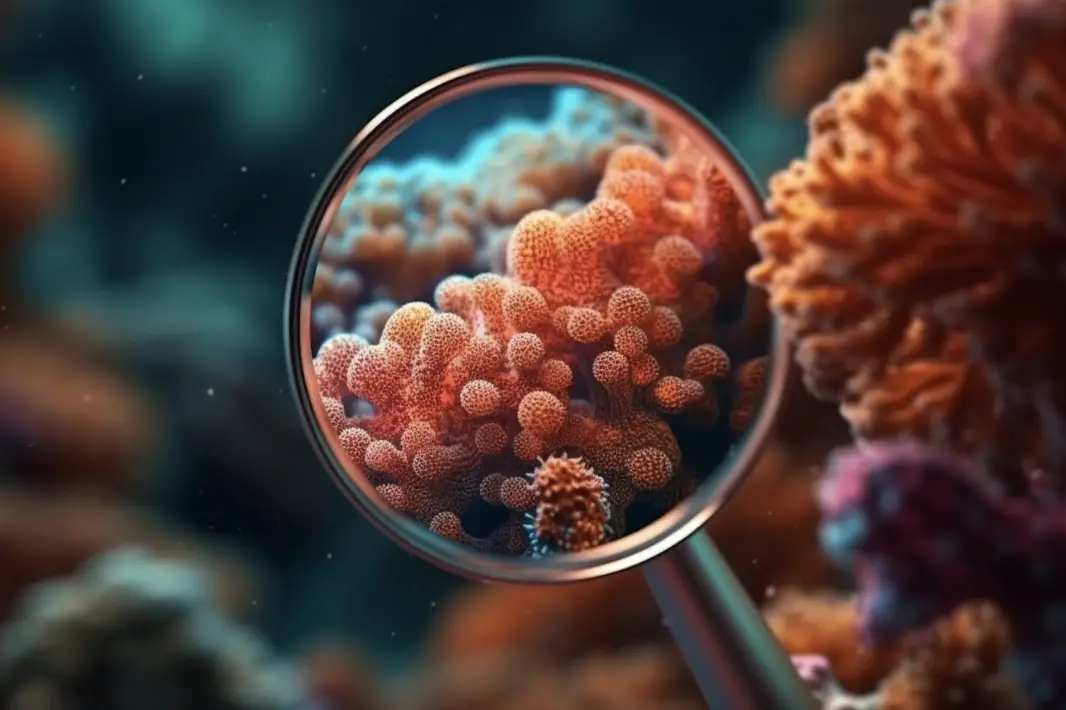Coral reefs are among the most diverse and productive ecosystems on Earth. They provide habitat for a wide variety of organisms, including some essential decomposers that play a vital role in the health and function of these ecosystems. In this blog post, I will discuss some of the decomposers that can be found in coral reefs, their importance to the ecosystem, and the threats they face from human activities.
1. Micro Decomposers
The microscopic decomposers found in coral reefs often receive the least attention for the greatest amount of work!
Micro decomposers in the ocean include bacteria and fungi and are the most important group of decomposers. Microscopic animals called protists or zooplankton can also be decomposers – or producers like the hybrid organism Euglena!
As we will see, chemosynthetic bacteria can also be regarded as decomposers to some degree.

These microorganisms can be found in all marine ecosystems and feed on a wide variety of organic material.
2. Marine Worms
Marine worms are a diverse group of organisms, including decomposers like Christmas tree worms and feather duster worms.
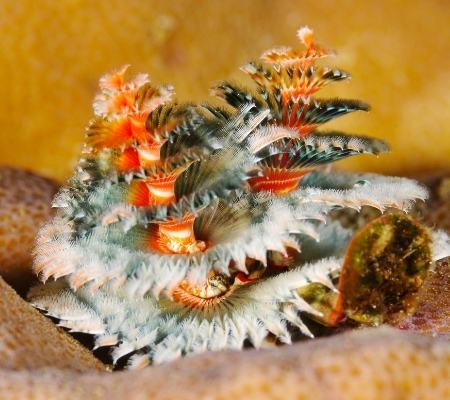
They are sedentary filter feeders with appendages that spread out and catch small organic particles suspended in the water. They can be found in coral reefs and intertidal rock pools.
3. Echinoderms
Unlike the sedentary marine worms, echinoderms, such as starfish, brittle stars, sea urchins and sea cucumbers, actively seek out dead organic matter on rocks and other surfaces.
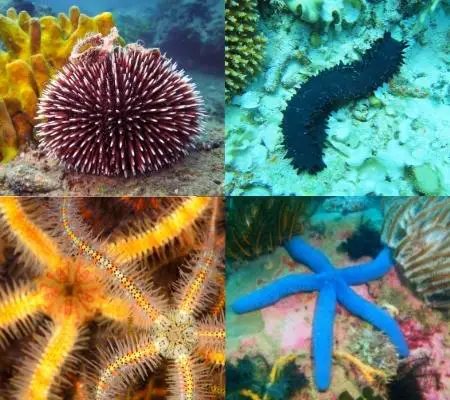
Many echinoderms are opportunistic carrion feeders or detritivores. Echinoderms are mostly found in shallow waters, like coral reefs and intertidal rock pools, but can also be found in deeper waters.
4. Crustaceans
Crustaceans can be found in all parts of the ocean. Crustaceans include crabs, shrimp, lobsters and even barnacles can function as decomposers.
Sessile crustaceans, like barnacles, feed on small organic particles suspended in the water, while more mobile species like crabs, shrimp and lobsters actively forage for food.

Crabs are opportunistic feeders and will eat almost anything they come across, including carrion, pieces of seaweed and small organic particles they sift out of the sand.
For example, barnacles live on intertidal rocks, but giant Japanese spider crabs are found in the deep sea.
5. Mollusks
Mollusks include mussels, clams, oysters, and snails. Sessile mollusks are filter feeders that feed on small organic particles suspended in the water.
Snails are important carrion feeders but can also feed on plant material or small organic particles in the sand.

Most mollusks prefer shallower waters. Mussels eat some dead organic material and can be found on intertidal rocks.
Giant clams live in coral reefs. Snails can be found on intertidal rocks, in coral reefs, or buried in the sand of beaches or the ocean floor.
Lastly, while no fish are decomposers in the classical sense, many fish are scavengers that help recycle dead plant and animal material on the bottom of fresh and saltwater habitats! Read more about them here!
Bacteria and Archaea: The Invisible Decomposers
Bacteria: Nature’s Recyclers
Bacteria are single-celled organisms that can be found in virtually every environment on Earth, including coral reefs. They are essential decomposers in these ecosystems, breaking down dead organic matter and recycling nutrients back into the ecosystem.
One of the primary decomposers in coral reefs is bacteria.
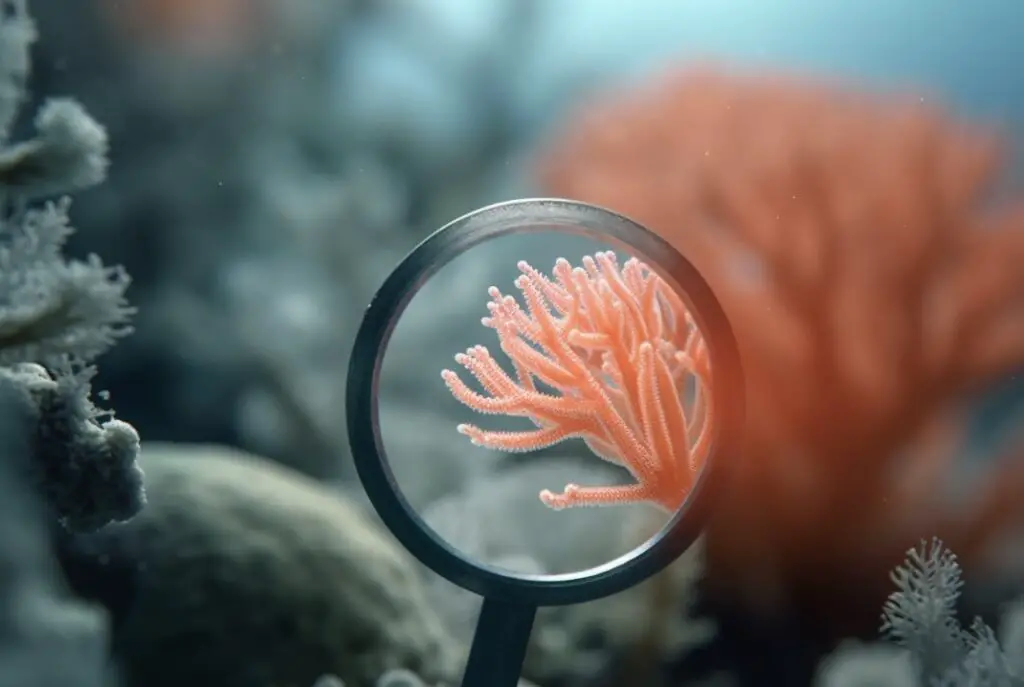
There are countless species of bacteria in coral reefs, each with its specialized role within the ecosystem. For example, some bacteria break down dead coral skeletons, while others decompose dead plant material.
Archaea: The Ancient Decomposers
Archaea are single-celled organisms similar to bacteria, but they belong to a separate domain of life. Like bacteria, archaea play a vital role as decomposers in coral reefs, particularly in the breakdown of organic matter within the sediments.
Sponges: Filter-Feeding Decomposers
Sponges: Masters of Microbial Symbiosis
Sponges are simple, filter-feeding animals that can be found in coral reefs worldwide. They play a crucial role in the decomposition process by consuming large amounts of organic matter, including dead organisms and detritus, and hosting a diverse community of bacteria within their bodies.
Sponges are essential decomposers in coral reefs, consuming organic matter and hosting bacteria that aid in decomposition.
These bacteria, in turn, help break down the organic matter within the sponge, providing nutrients for both the sponge and the surrounding ecosystem.
Worms: The Burrowers and Bioturbators
Polychaete Worms: The Colorful Decomposers
Polychaete worms are a diverse group of segmented worms found in coral reefs. They play an essential role in decomposition by consuming dead organic matter and recycling nutrients back into the ecosystem. Some polychaete worms, such as the Christmas tree worm, are even known for their beautiful, colorful appearances.
Bristle Worms: The Nighttime Scavengers
Bristle worms are a type of polychaete worm commonly found in coral reefs. These nocturnal scavengers emerge from their burrows at night to feed on dead organisms and detritus, playing a crucial role in the decomposition process.
Crustaceans: The Scavengers and Diggers
Crabs: The Armored Decomposers
Crabs are a diverse group of crustaceans found in coral reefs worldwide. They play a crucial role as decomposers by consuming dead organisms and detritus, as well as breaking down larger organic matter into smaller pieces that can be further decomposed by other organisms.
Shrimp: The Tiny Waste Managers
Shrimp are small crustaceans that play an important role in coral reef decomposition. They consume dead organisms and detritus, breaking down organic matter and recycling nutrients back into the ecosystem. Some shrimp species, such as the pistol shrimp, even create intricate burrow systems that help aerate the sediments and promote decomposition.
Mollusks: The Grazers and Scavengers
Sea Slugs: The Colorful Waste Consumers
Sea slugs are a diverse group of soft-bodied mollusks found in coral reefs. While many sea slugs are known for their vibrant colors and intricate patterns, they also play an essential role as decomposers. They consume dead organisms, detritus, and even algae, breaking down organic matter and recycling nutrients back into the ecosystem.
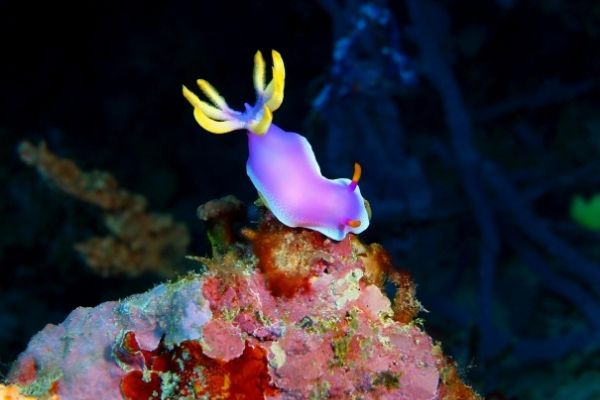
Sea Snails: The Slow and Steady Decomposers
Sea snails are a diverse group of gastropod mollusks found in coral reefs. They play a crucial role as decomposers by consuming dead organisms and detritus, breaking down organic matter, and recycling nutrients back into the ecosystem.
In conclusion, coral reefs are home to a wide variety of decomposers, including bacteria, sponges, worms, crustaceans, and mollusks. These organisms play a crucial role in breaking down dead organic matter and recycling nutrients back into the ecosystem, ensuring the health and productivity of these vital ecosystems. Here are ten facts about decomposers in coral reefs:
1. Bacteria are the primary decomposers in coral reefs.
2. Archaea aid in the decomposition of organic matter within sediments.
3. Sponges consume organic matter and host bacteria that aid in decomposition.
4. Polychaete worms consume dead organic matter and recycle nutrients.
5. Bristle worms are nocturnal scavengers that play a crucial role in decomposition.
6. Crabs consume dead organisms and detritus, breaking down organic matter.
7. Shrimp help break down organic matter and recycle nutrients back into the ecosystem.
8. Sea slugs consume dead organisms, detritus, and algae, breaking down organic matter.
9. Sea snails consume dead organisms and detritus, breaking down organic matter.
10. Decomposers in coral reefs help to maintain the health and productivity of these essential ecosystems.
FAQs
What are the decomposers in the coral reef?
The decomposers in the coral reef are mainly bacteria and fungi that break down organic matter from dead coral, algae, and other organisms.
What are the 3 major types of coral reef producers list and describe them?
The three major types of coral reef producers are algae, zooxanthellae, and phytoplankton. Algae are photosynthetic organisms that can be found in various forms, including seaweed, turf algae, and coralline algae. Zooxanthellae are single-celled algae that live within the tissues of coral polyps and provide them with energy through photosynthesis. Phytoplankton are microscopic plants that float in the water column and are an important food source for many coral reef organisms.
What do decomposers eat in the coral reef?
Decomposers in the coral reef ecosystem primarily feed on dead organic matter, such as dead coral, algae, and animal waste.
What are all the consumers in coral reefs?
Consumers in coral reefs include a variety of organisms such as herbivorous fish, carnivorous fish, sea turtles, sea stars, sea urchins, and mollusks.
What type of consumer is a coral?
Coral is not a consumer, but rather a sessile organism that obtains its energy through photosynthesis or by filtering small particles from the water.
What are the producers consumers and decomposers in the coral reef?
Producers in the coral reef are typically algae and other photosynthetic organisms that create energy from sunlight. Consumers in the coral reef include a variety of fish, crustaceans, and other organisms that eat the producers or other animals. Decomposers in the coral reef are bacteria and other microorganisms that break down dead organic matter and recycle nutrients back into the ecosystem.

